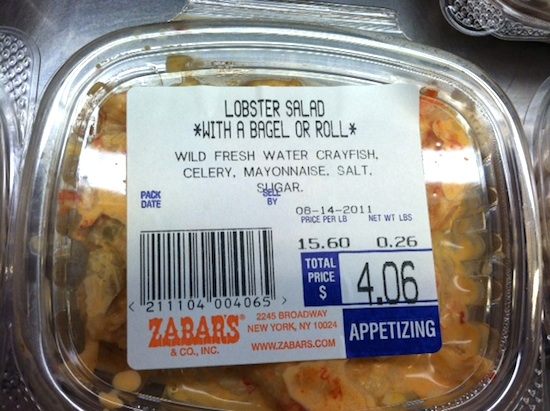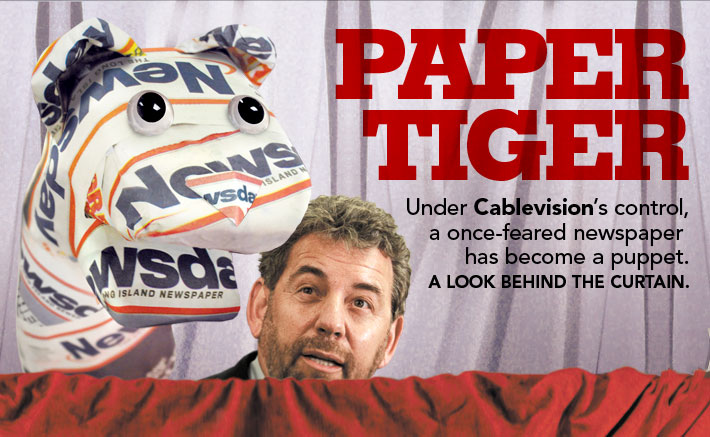

Zabar's on Manhattan's Upper West Side has been selling Lobster Salad made with freshwater crawfish, not lobster, for more than 20 years. (Photo Courtesy of the West Side Rag)
I love my lobster.
The large marine crustaceans are particularly succulent hot, steaming, drenched in butter and accompanying a side of baked potatoes, preferably on a massive platter several inches in front of me.
They are a special meal, indeed. Some memorable lobster-feasting moments I recall took place back in college, where several dozen friends and I would pool our together money for a massive lobster bake, usually accompanied by several equally massive kegs of beer. Natural Lite Ice, if I remember correctly. Of course, there were also the odd birthday treks several towns over to that holiest of seafood sanctums, Red Lobster, where friends and family members would invariably fill up on the free crab bread rolls prior to the main course and end up getting the All-You-Can-Eat Shrimp baskets or Stuffed Flounder instead of the clawed arthropods. Rarely would anyone actually get the restaurant’s namesake, but at least we were in its presence. A chance encounter with the creature’s moist white insides during a day trip out East near Montauk also comes to mind.
You can imagine my shock, therefore, and my dismay, at the revelation this week by the West Side Rag and The New York Times that Zabar’s legendary supermarket grocery at 80th St. and Broadway—a fixture of Manhattan’s Upper West Side for nearly 80 years and an absolutely must-stop whenever I’m up there—has for at least the past 15 years been selling Lobster Salad that contains no lobster in it at all.
Plenty of crawfish, “Wild Fresh Water Crawfish,” to be exact, according to its ingredients label, along with “Celery, Mayonnaise, Salt, Sugar;” but alas, no lobster.
No lobster.
“How could this be?” grumbled my stomach. “Zabar’s is one of the best places on Earth. The Zabars are good, decent people. Honest. They’ve been there forever. They love their food, respect and treat their patrons as if members of their own family—many members of which actually work there.”
“‘If you go to Wikipedia,’” the Times quotes Saul Zabar, the store’s 83-year-old president and co-owner, as explaining, “‘you will find that crawfish in many parts of the country is referred to as lobster.’”
The West Side Rag—the blog of record for the Upper West Side—reported the disturbing disclosure in an Aug. 10 post “Zabar’s Committing Lobster Salad Fraud?” after reading about New Orleans The Times-Picayune columnist Doug MacCash’s chance encounter with the charlatan crawfish in his Aug. 1 blog post “In New York City A Lucky Crawfish Can Become A Lobster” and subsequent editorial “No Fake Lobsters Allowed” in the Bangor Daily News.
“Last month my family and I were standing in line at Zabar’s grocery on Broadway in New York waiting to order bagels,” wrote MacCash. “The tiny tubs of lobster salad in the refrigerator case caught my eye. Lobster salad on a bagel; why not? It was delicious, but the pink/orange tails seemed small and somehow familiar.
“Then I read the label,” he continued. “The lobster salad ingredients were: wild freshwater crayfish, mayonnaise, celery, salt and sugar
“Wild freshwater crayfish? Really? At $16.95 per pound?” lamented MacCash.
Next, the Godfathers of the lobster realm—the kingmakers of the exoskeletal invertebrate realm, if you will—caught wind, the Maine Lobster Council.
“Somehow the people at the Maine Lobster Council found out about this transgression and sprung into action—clearly they get an email every time the word ‘lobster’ is mentioned anywhere,” wrote “Avi,” the West Side Rag’s editor. “Suddenly, the seemingly innocent use of the name lobster on a tub of crayfish salad escalated into a bit of regional warfare. You see, they’re pretty serious about lobster up in Maine, and the use of a lobster’s name in vain is a major offense.”

The 76-year-old Zabar's legendary grocery on the Upper West Side's West 80th St. and Broadway is asking Facebook users to help rename its Lobster Salad, now Seafare Salad, (Photo Courtesy of the West Side Rag)
The Lunchbox had to get to the bottom of all this.
“It’s at least 20 years we’ve been doing it,” Saul Zabar tells the Press. “And we’ve been calling it Lobster Salad. And it’s been crawfish, wild-caught crawfish.
“The ingredients—the label’s very clear—the ingredient part is very large and it says crawfish on it, so anybody picking it up, looking at the ingredients, would see crawfish,” he explains. “I mean, it wasn’t hidden, it wasn’t small, it was really right in your face. We’ve got very few complaints in all the years that we have been making this salad.
“We went to a Wikipedia, we went to other sources, and crawfish are in the lobster family,” he continues. “In some parts of the country they’re referred to as lobsters. There’s a lot of different kinds of lobsters. There’s spiny lobster, there’s Caribbean lobster, there’s all kinds of lobsters. But the one that people usually think if is the Maine lobster, the Homarus americanus. And so we called it ‘lobster salad,’ we didn’t think anything about it. And that was it. Then this whole business started with this guy from New Orleans.
“So,” Zabar explains, in the wake of Lobstergate, “we changed the name.”
To Seafare Salad.
“Which a lot of people are not happy with,” he says, adding that besides the controversy stemming from a fresh water crawfish being labeled from the sea, Seafare Salad is also trademarked. “So now we’re going to put on our Facebook [page], we’re going to ask people for their recommendations of what we should call it. And then, the name that we’ll pick, the name that we’ll choose, we’ll give you a gift.
“Some bagels,” he laughs. “We’ll give them some bagels. We’ll give them some crawfish salad.”
Zabar can’t recall another incident in the grocery’s 76-year existence that has attracted so much media attention, he says.
“I don’t know, doesn’t the world have some problems besides this?” he laughs. “On the front page of the Times you were having riots in Tel Aviv, you were having problems with the market—I mean it was a ton of stuff. Syria’s killing people.
“And this, right on the front page of the Times,” says Zabar. “Maybe… Maybe they kind of just needed some, what do you call it?
“Humor,” he answers. “Comic relief from all that bad stuff.”
“The publicity is great,” he adds—with the exception of the “two or three” messages he received that were “really vitriolic.”
The bottom line, Zabar says: “It wasn’t anything that we did deliberately. We’ve been doing the same for the last 20 years—and then we did the research on crawfish.
“It’s in the lobster family,” he reiterates. “In some places in the country they do call them lobsters, and it looked like a miniature lobster, with miniature claws and everything.”
Zabar, who’s worked at his family’s shop since 1950, points to the last line of the Times story, a quote from The Time Picayune’s MacCash, the guy from the bayou who started this whole hubbub.
“‘It was good; I ate every bit,’” it reads.






